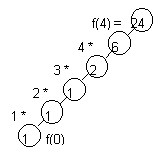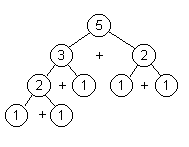To Recurse or Not to Recurse
Analysis
Data Structures & Program Design by Robert L. Kruse, Chapter 7, contains a good discussion of Recursion as does C++ fo You ++ by Litvin & Litvin, Chapter 19
Iteration vs. Recursion
One device in deciding whether to write a module recursively is the recursion tree. Let us examine two modules used earlier. For the call factorial(4), observe the tree:
int factorial (int n)
{
if ( n == 0 )
return 1;
return n * factorial ( n - 1);
} | |
When the tree is linear, the module can be written as easily iteratively.
int factorial ( int n )
}
int fact = 1;
for ( int index = 1; index <= n; index++)
fact = fact * index;
return fact;
}
Another Example:
int fibo ( int n)
{
if ( n < 3)
return 1;
else
return fibo (n - 1) + fibo ( n - 2);
} | |
For the call fibo(5) observe the tree. Even with two calls to the function, there is much redundancy. Written iteratively:
int fibo (int n )
{ if ( n < 3 )
return 1;
else
{ int f;
int a = 1;
int b = 1;
for ( int index = 3; index <= n; index++)
{ f = a + b;
a = b;
b = f;
}
return f;
}
}
Tail Recursion
If space is a consideration then tail recursion should probably be
removed. Tail recursion is a recursive call at the end of the module.
In a recursive module, memory locations are held until the module is
completed, thus occupying more space than if the variables were changed
directly. The previous example of removal of tail recursion is from
the Robert L. Kruse book on Data Structures & Program Design.
To Recurse or not to Recurse
Since recursion can always be replaced by iteration and, perhaps, use
of a stack and conversely, we need to question our use of recursion.
- If a program involves stacks, would recursion be more natural
and understandable?
- Is the recursive code clearer?
- If a recursion tree results in a chain then iteration is probably
as straightforward.
- If a recursion tree results in duplications then recursion is
probably inefficient.
- Tail recursion should be avoided if space is a consideration.
The Litvins in their text C++ for You ++ state that "recursion should
be used when it significantly simplifies the code without excessive
performance loss." They suggest that recursion is very useful for
dealing with
- nested structures (Towers of Hanoi, "Paint-a-Square")
- branching processes (binary search),
Recursion should be avoided in linear structures (factorial) or linear
processes (sequential search). Iteration is easier and more
efficient in these situations involving tail recursion.
Continue to: Unit 3 / Prev / Next
